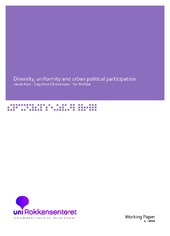| dc.contributor.author | Aars, Jacob | eng |
| dc.contributor.author | Christensen, Dag Arne | eng |
| dc.contributor.author | Midtbø, Tor | eng |
| dc.date.accessioned | 2012-01-05T14:31:58Z | |
| dc.date.accessioned | 2020-12-10T06:33:30Z | |
| dc.date.available | 2012-01-05T14:31:58Z | |
| dc.date.available | 2020-12-10T06:33:30Z | |
| dc.date.issued | 2010-05 | eng |
| dc.identifier.issn | 1503-0946 | |
| dc.identifier.uri | https://hdl.handle.net/1956/5359 | |
| dc.description.abstract | Our paper aims to analyse the effects of heterogeneity/homogeneity on political participation in three metropolitan areas in Norway. One hypothesis is that socially and/or ethnically homogenous urban areas will have a negative impact on participation. When social groups with different backgrounds are less likely to encounter, the mobilising effect of conflict is weakened. Hence, participation will decline. Another assumption points in a different direction: Diversity may lead to paralysis. Particularly in cases of multiple identities, citizens will be exposed to cross-pressure and will tend to abstain from participating. We have used multilevel modelling in order to investigate the effects of contextual factors on individual behaviour. Hence, the empirical analysis will be based on the combination of two data sets: At the individual level (level 1) we will make use of a comprehensive citizen survey comprising a total of more than 6.000 respondents from three city regions and 73 municipalities. Among these are the three core cities of Oslo, Bergen, and Stavanger. At the aggregate level (level 2) we employ a data set consisting of more than 2.000 variables characterizing the municipalities included in the survey. The analysis reveals a negative relationship between heterogeneity and participation. Hence, our data do not support the contention that social environments consisting of multiple social groups foster vibrant political involvement. On the contrary, our findings lend support to the cross-pressure hypothesis, indicating that the diversity of personal experiences within a community will tend to lessen the citizens’ involvement in political affairs. | en_US |
| dc.description.abstract | Notatet analyserer effekten på politisk deltakelse av å bo innenfor sosialt heterogene/homogene kontekster. Analysene er gjort innenfor tre norske storbyregioner. Vi har anvendt flernivåanalyse for å undersøke effektene av kontekstuelle faktorer på individuell atferd. De empiriske analysene er basert på kombinasjonen av to datasett: På individnivå (nivå 1) bruker vi en befolkningssurvey gjennomført i de tre storbyregionene Bergen, Oslo og Stavanger. I alt er undersøkelsen gjennomført i 73 kommuner og omfatter mer enn 6.000 individer. På kommunenivå(nivå 2) bruker vi et stort datasett som omfatter en lang rekke opplysninger om kommunene. Et av hovedfunnene fra denne analysen er at det stedet folk bor har en effekt på deres partipreferanser, selv etter at det er kontrollert for betydningen av individuelle bakgrunnstrekk. Én mulig antakelse er at sosial ulikhet innenfor et område skaper stimulerende møter mellom folk med ulik bakgrunn og at dette i neste omgang skaper engasjement og deltakelse. Våre analyser støtter ikke en slik hypotese. I stedet finner vi at politisk deltakelse blant innbyggerne er lavere i kommuner og bydeler preget av sosial ulikhet | en_US |
| dc.language.iso | eng | eng |
| dc.publisher | Stein Rokkan Centre for Social Studies | eng |
| dc.relation.ispartofseries | Working Paper | en |
| dc.relation.ispartofseries | 4-2010 | en |
| dc.title | Diversity, uniformity and urban political participation | eng |
| dc.type | Working paper | eng |
| dc.rights.holder | Copyright Stein Rokkan Centre for Social Studies. All rights reserved | |
| dc.subject.nsi | VDP::Samfunnsvitenskap: 200 | nob |
